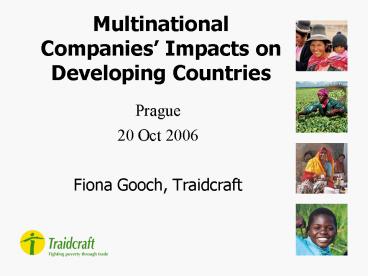Multinational Companies Impacts on Developing Countries - PowerPoint PPT Presentation
1 / 28
Title:
Multinational Companies Impacts on Developing Countries
Description:
Impacts Commercial Companies have on Vulnerable people. International ... action needed? ... at large and respects human, social and environmental rights. ... – PowerPoint PPT presentation
Number of Views:213
Avg rating:3.0/5.0
Title: Multinational Companies Impacts on Developing Countries
1
Multinational Companies Impacts on Developing
Countries
- Prague
- 20 Oct 2006
- Fiona Gooch, Traidcraft
2
Overview
- Traidcraft
- Impacts Commercial Companies have on Vulnerable
people - International Supply chains
- Responsible Purchasing Initiative
- European Coalition for Corporate Justice
3
Traidcraft Plc
- Established 1979
- Values driven Social Enterprise
- Leading UK Fair Trade organisation
- 1000 Agricultural, textiles, home interiors
products - Buy from 100 producer groups in Africa, Asia
South America - Turnover gt16m
- 1993 Initiator of corporate social reporting
4
Traidcrafts Social Accounts
www.traidcraft.co.uk
5
Two sides of Traidcraft
A business with development objectives Traidcraft
plc
A development NGO specialising in
business Traidcraft Exchange
- Small enterprise development
- Facilitate market access
- Policy work to improve impact of trade on the
poorest in developing countries
6
Question to YOU
- Are commercial companies
- reducing poverty in developing countries? or
- increasing poverty/vulnerability?
7
European Companies Impact on Poor People in
Developing Countries
- Sell products to poor people e.g. drugs, seeds,
baby milk - Poor people are neighbours of EU companies e.g.
Coca Cola in India, Shell in Nigeria - Employ poor people e.g. Unilever (factories),
AngloAmerican (mining) - Poor people work/supply EU companies
8
Examples
- Foreign Direct Investment in developing countries
has increased 6-fold over 10 years. - 6 companies dominate 70 world trade in
agricultural commodities - 1 company, Cargill controls 80 global grain
distribution - . . . . . . Clearly private sector dominance has
development implications
9
Companies Impact on Lives
10
Examples of negative impacts on poverty in
international supply chains.
11
Vulnerable workers - Chile
12
Family Impacts of Forced overtime in Kenya
13
Distribution of 1 retail value of bananas in the
supply chain
14
Vulnerable workers - Morecambe Bay
15
Pushing Risks Down the Supply Chain
Retailers brands push for - lower prices from
producers - fast and flexible production - high
technical quality standards - better labour
conditions but without a long-term commitment
Producers, as employers - hire women
migrants - use short-term contracts evade
benefits - put workers under excessive pressure -
undermine organising - hide labour rights
violations
Precariously employed workers - insecure on
contracts with few benefits - exhausted by long
hours high targets - undermined in organising
for their rights
16
EU Food Supply Chain Bottleneck
The Supply Chain Bottleneck in EuropeSource
Grievink (2003)
Consumers 160,000,000 Customers
89,000,000 Outlets 170,000 Supermarket formats
600 Buying desks 110 Manufacturers
8,600 Semi-manufacturers 80,000 Suppliers
160,000 Farmers/producers 3,200,000
POWER
17
Concentration in Banana supply chain from Latin
America Caribbean to UK
18
Responsible Purchasing Project
- CTM, Italy
- IDEAS, Spain
- Oxfam Wereldwinkels, Belgium
- Traidcraft, UK
- EU funded project 2005 - now
19
- Responsible Purchasing
- 4 case study sectors
- Business case
- 1st steps for companies
- Indicators to monitor Buying
- Public policy options
19
20
Our learning?
- Power Imbalance in supply chains
- Limited safe-guards for most vulnerable
- Lack of business accountability/responsibility
for Impact - Gaps in norms set for business behaviour
- Existing norms (e.g. ILO) ignored
- Lack of transparency of business relations/impact
- Inability for impacted 3rd parties to hold
companies to account - EU Public policy response is voluntary Corporate
Social Responsibility . But insufficient
21
Why Government action needed?
- Harmful companies private companies (Top
Shop), slow (Walmart, Lidl), sick companies - Trends - Better, Cheaper, Faster
- Market dominance -gt Bully suppliers
- CSR/Ethical trade commitments limited/harmful
impact
22
Backfiring on social objectives ...
23
Collaboration is needed
- Change needed at EU national level
- Any organisations actions ALONE are ignored
24
European Coalition for Corporate Justice (ECCJ)
- civil society organisations from across Europe.
- Our vision is of a sustainable world in which
corporations drive for profit is balanced by the
interest of society at large and respects human,
social and environmental rights.
25
What ECCJ does
- -co-operation amongst NGOs
- -Influence Corporate Justice policies of the EU
and its member states. - -Inform the general public
- -Present a joint civil society vision
- -implementation of EU policies on Corporate
Justice by the member states - -Build capacity
26
5 PRINCIPLES
- 1. References to international standards
- 2. Stakeholders rights. Companies and their
directors can be held accountable. - 3. Responsibility throughout the supply chain
- 4. Reporting of environmental, social impacts
Lobbying. Backed up with Independent monitoring
and verification - 5. A leading role for public authorities
27
Thanks
- Any questions on presentation?
28
For more information
- www.responsible-purchasing.org
- www.traidcraft.org
- fionag_at_traidcraft.org,
- www.corporatejustice.org
- Contact Virginie Giarmana, Coordinator info_at_corp
oratejustice.org































